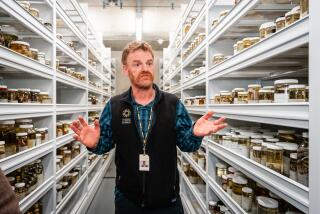Snake Venom May Slow Breast Cancer
- Share via
Snake venom may hold the promise of fighting breast cancer, according to USC researchers. While studying the properties of copperhead snake venom, biochemist Francis Markland and his colleagues told an American Chemical Society meeting last week in Boston that the venom contains a protein that could block tiny cells known as platelets from binding together. They then figured the protein might help slow the growth of cancer by blocking the invasive actions of tumor cells, Markland said.
The researchers studied the protein’s action in human breast cancer cells implanted in mice and found that the protein slowed the growth rate of the cancer by 60% to 70%. In addition, the mice that received the protein had a 90% reduction in the spread of tumor cells into the lungs, the study found.
Instead of actually killing the cells, the protein known as contortrostatin sends the tumor cells into a “suspended state of animation,” Markland said, greatly slowing the cancer’s progress in the body. The protein also helps block the development of new blood vessels, which tumors need to grow, he said.
* THE LATEST
For more medical news, see Journalese. S2





